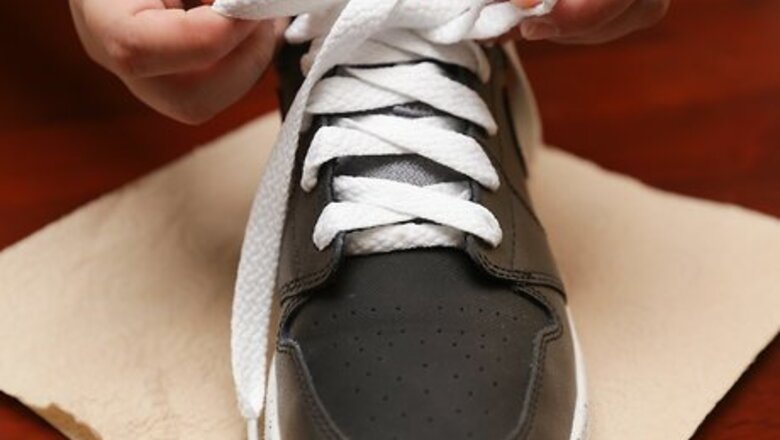
views
Measuring and Cutting
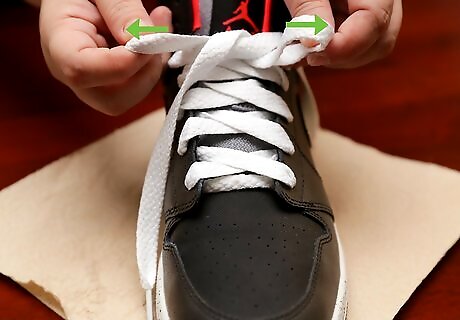
Put your shoes on. While you can eyeball how much of the laces you want to cut off, it’s usually best to try on your shoes to see how much excess lace there is on each side. Tie your shoes as you normally would for the most comfortable fit, and take note of how long the laces are so you can decide how much you want to remove. When you’re trying to decide how much of the laces that you want to cut, think about how you prefer to tie your shoes. If you don’t want to double knot the laces, tie them normally and see how much of the length you’ll need to take off on each side.
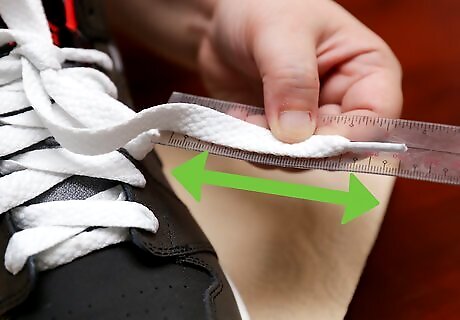
Mark your laces. You’ll need to know exactly where to cut the laces, so it helps to mark them at the right spot. Use a felt tip pen to draw lines on each end of the laces to indicate the excess that you want to remove. You can leave your shoes on when you mark the laces, but it’s often easier to use a ruler to determine how many inches you want to remove from each end with the shoes on and then remove the laces to mark them. Shoelaces come in standard sizes, such as 30-, 40-, or 54-inches, so once you figure out how much excess there usually is on your shoes, you’ll know where to mark laces of the same length in the future.
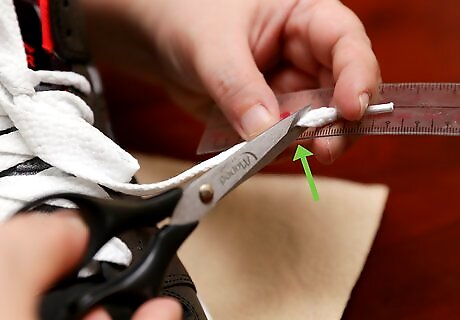
Cut the laces. They’re usually fairly easy to cut, so any household scissors should do the trick. However, you’ll want to make sure that it’s a sharp pair to minimize fraying when you cut the laces. Follow the marks that you made to ensure that you cut at the right spot. Don’t cut all of the excess off one end of the lace. You’ll wind up with one finished end and one unfinished end, so they won’t match when you relace your shoes.
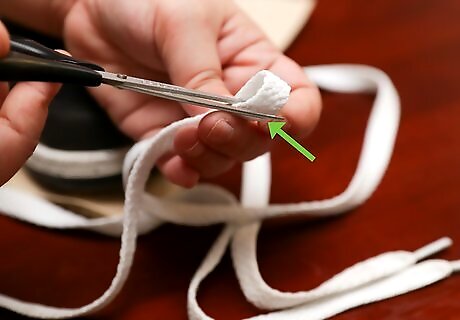
Consider cutting length from middle of the lace. Instead of trimming the excess from each end of the lace and having to finish the ends, you can opt to take out the extra length from the center. You'll wind up with two pieces that each have an aglet at one end, so you only have to tie them together to create a single lace. Try on the shoes, use a ruler to see how much extra there is on each side, add the numbers together, and cut that amount for the middle of the lace. Tie the pieces of the lace together as tightly as possible, and secure it further by applying a small amount of instant glue to the knot and allowing it to dry. If there is any excess lace outside the knot, make sure to trim it away. You can also sew the two pieces together.
Finishing the Ends
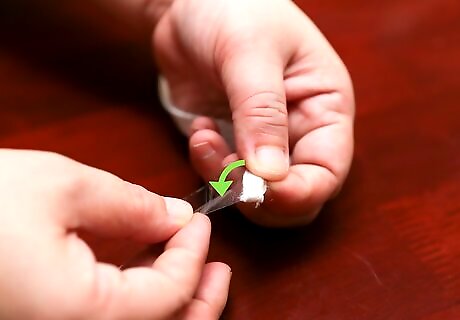
Wrap adhesive tape around the ends. Lay a piece of adhesive tape sticky side on a flat surface, and place the lace towards the center. Take your time rolling the tape tightly around the lace to form a sturdy, finished tip, also known as the aglet. If there is any excess lace protruding past the tape, trim it with scissors. To make the tip extra sturdy, you can place a couple of dots of glue beneath the end of the tape before you seal it over the lace. Finishing the ends with adhesive tape usually creates a tip that resembles plastic aglets on store bought laces well enough that you can get away with cutting the excess length off only one end of the lace if you prefer.
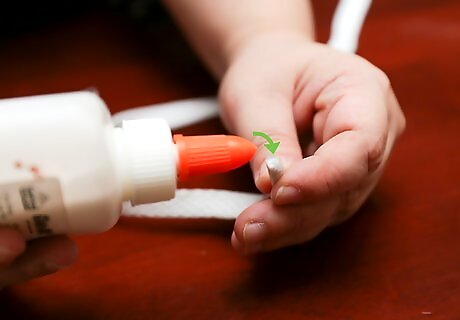
Apply glue to the ends. Cover the tips of the laces with a small amount of glue, and as it starts to dry, press on the glue to help it absorb into the lace and reduce the thickness. Once the glue is completely dry, you can trim off any excess and apply another thin coat to increase the aglet’s durability and give it a smoother look. Don’t use “instant glue”, such as Krazy Glue, because it will bond with your skin, making it impossible to shape the end of the lace. The best type of glue to use is one with an acetone-based solvent, such as Elmer’s Clear Household Cement or Tarzan’s Grip. They dry clear, and are waterproof, so they form ideal aglets. If you don’t have any glue on hand, you can use clear nail polish in its place.
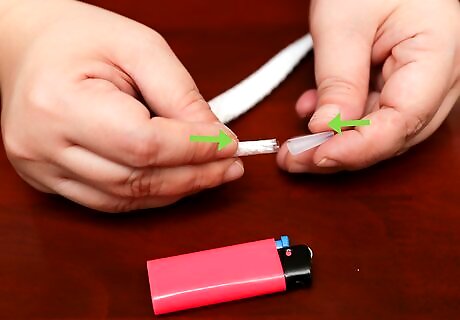
Use heat shrink tubing. Usually used to insulate electrical joints, the tubing is strong and flexible enough to work as effective aglets. You’ll need to cut the tubing lengthwise to match the size of most aglets, which is typically about a ½ inch. Slip a section over each end of the lace, and then hold the tubing over a candle, lighter, or other flame so the material can contract. Choose a diameter of tubing that will slip over the end of your laces. In most cases, 4 to 5 millimeter is a good fit. When you’re placing the tubing over the ends of the lace, it often helps to twist it into place so you don’t wind up fraying the lace. It doesn’t take much heat to shrink the tubing, so make sure to hold it a far enough distance from your flame. If it starts to smoke or bubble, it’s too hot. If you have a small, travel-size hair straightening iron, you can use that to safely heat the tubing. Gently clamp it over the end for five to ten seconds to shrink the tubing and finish the laces. Clear heat shrink tubing will provide the most similar look to factory-made aglets.
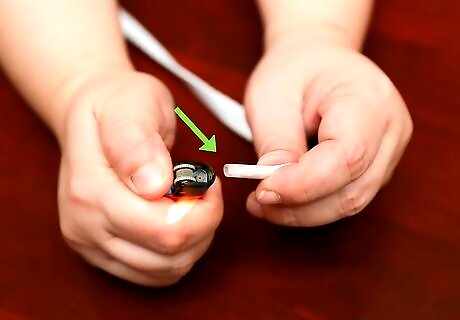
Melt the ends. If your laces are made of a synthetic material, you can actually melt the material itself to create a smooth, finished tip. Hold the end of the lace over a candle, match, lighter, or other flame to melt the material just enough to form a sealed edge. Make sure not to hold the lace too close to the flame, or you may light the entire lace on fire. It’s best to melt the lace over a sink in case a fire does occur. Don’t touch the synthetic material of the lace once it starts to melt because it may stick to your skin.
Tying Your Shoes
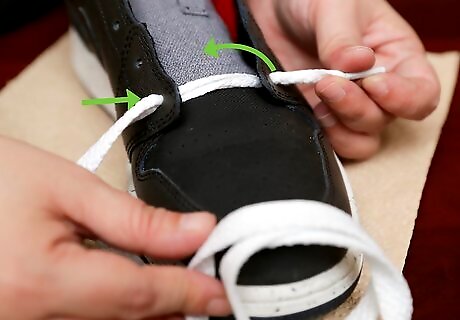
Start at the bottom eyelets. When you’re lacing your shoes, you should always begin with the eyelets closest to the toes. That allows you to pull the laces from one set of eyelets at a time to tighten them and provide the most comfortable fit. Push the tips of the laces through the pair of eyelets and adjust until the length is equal on both sides. Whatever method you use to finish the ends of your shortened laces, make sure you’ve give them proper time to dry or cool before lacing your shoes. Many shoes features two rows of parallel eyelets, with one set closer to the shoe’s tongue and one further. For wide feet, use the eyelets closest to the tongue to provide more space for the foot. If you have narrow feet, lace the shoes through the eyelets furthest away from the tongue to bring up the shoe for a closer fit.
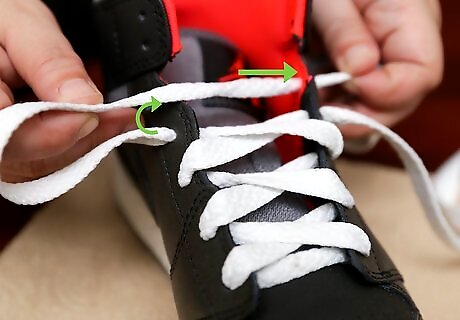
Crisscross the laces. While you can lace your shoes in a variety of ways, crisscrossing the laces over one another works well for most people. Once you’ve threaded the lace through the bottom eyelets, pull the right side across to place it through the next highest eyelet on the left side and do the same to the left to the right. Continue alternating all the way until the final set of eyelets. Crisscrossing your laces usually provides the most comfort because the shoelace crossover happens in the space between the two sides of the shoe, so they aren’t pressed against your foot.
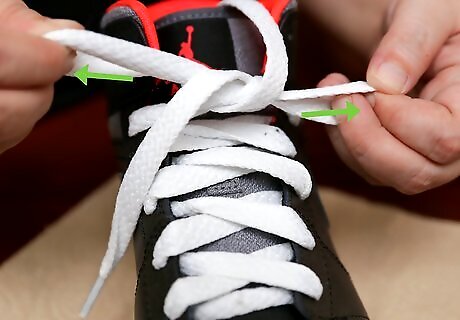
Tie your shoe. You should do it as normally would, but because you’ve shortened the lace, you shouldn’t need to double knot or tie the lace. When it’s knotted, you’ll be able to tell if you’ve trimmed it sufficiently. If you haven’t cut enough of the lace off, trim a little bit more and repeat the steps for finishing the tips.




















Comments
0 comment